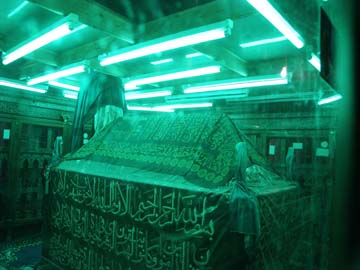MAIL OF ISLAM
™
Knowledge & Wisdom
MAIL OF ISLAM
™
Knowledge & Wisdom
 Imam Shafie RadhiAllahu Anhu
Imam Shafie RadhiAllahu Anhu
Abu Abdullah Muhammad ibn Idris ash-Shafi'e (767 - January 20, 820) commonly called Imam al-Shafe'i or fully, Muhammad ibn Idris ibn al-Abbas ibn Uthman ibn Shafi’i ibn al-Sa’ib ibn ‘Ubayd ibn Abd Yazid ibn Hashim ibn al-Muttalib.
Imam Shafi'e RadhiAllahu Anhu was born in 767 in Asqalan, Gaza. His father died when he was two, afterwitch he and his mother Umm al Hasan moved to Makkah where they lived in extreme poverty.
Many stories have been related about his life. It is said that he memorized the Quran at by age seven and by ten he had memorized the Muwatta of Imam Malik RadhiAllahu Anhu. He was a recognised mufti at the age of fifteen. He recited the entire Quran daily and twice a day during the month of Ramadan. Some accounts claim he was very handsome, that his beard did not exceed the length of his fist, and that it was very black.
He was also an accomplished archer, poet, and orator. Some accounts claim there were a group of Bedouin who would come to his lectures just to listen to his eloquent use of the language. He was given the title of Nasir al Sunnah, the defender of the sunnah.
His teachers included Malik ibn Anas RadhiAllahu Anhu and Muhammad ibn al Hasan al Shaybani RadhiAllahu Anhu, whom he studied under in Madinah and Baghdad. During the reign of Harun Rashid, he had an appointment as a judge in Najran. His dedication to justice, even when if it required criticizing the governor, caused him some problems, and he was falsely accused of aiding the Alawis in a revolt. At this time, al Shaybani was the chief justice, and his defense of ash-Shafe'i, coupled with ash-Shafe'i’s own eloquent arguement, convinced Harun Rashid to dismiss the charge, and to direct al Shaybani RadhiAllahu Anhu to take Imam Shafi'i RadhiAllahu Anhu to Baghdad.
He was asked why he used a walking stick. He replied, “To remind myself that I am on a journey out of this life.” He died at the age of 53 on January 20, 820 and was buried in al-Fustat, Egypt. Salahuddin al Ayyubi built a madrasa on the site.
The Jurisprudence of Imam Shafe'i RadhiAllahu Anhu In Baghdad, he developed his first madhab, influenced by the teachings of both Imam Abu Hanifa and Imam Malik . Thus, his work there is known as al Madhab al Qadim lil Imam as Shafe’i, or the old school of ash-Shafi'i.
Sheikh Nuh Ha Mim Keller writes, “When the persecution arose over the uncreatedness of the Qur’an, he spoke to Imam Ahmad ibn Hanbal RadhiAllahu Anhu and they mutually agreed that rather than risk the loss of both Islam’s living mujtahids, they should part company, Imam Shafi'i RadhiAllahu Anhu travelling with his books and belongings to Cairo, and Imam Ahmad RadhiAllahu Anhu remaining in Iraq.” In less than four years Imam Shafi'i RadhiAllahu Anhu had re-established his second school of fiqh, which is transmitted in his work Kitab al Umm.
Apocryphal accounts claim that Imam Ahmad RadhiAllahu Anhu said of Imam Shafi'i RadhiAllahu Anhu, I never saw anyone adhere more to hadith than Imam Shafi'i RadhiAllahu Anhu. No one preceded him in writing down the hadith in a book. Imam Ahmad RadhiAllahu Anhu is also claimed to have said, Not one of the scholars of hadith touched an inkwell nor a pen except he owed a huge debt to Imam Shafi'i RadhiAllahu Anhu.
Among the books that Imam Shafi'i RadhiAllahu Anhu wrote is al Risala, the first book wherein he examined usul al-fiqh (sources of jurisprudence): the Qur’an, the Sunnah, qiyas (analogy), and ijma' (scholarly consensus). He also divided innovation into good and bad, based on the recorded saying of Umar RadhiAllahu Anhu about tarawih. He authored more than 100 books. Imam al Shaybani RadhiAllahu Anhu said, If the scholars of hadith speak, it is in the language of Imam Shafi'i RadhiAllahu Anhu.
Imam Shafi'i RadhiAllahu Anhu’s followers include some of the foremost scholars of Islam, such as: Imam al Bukhari, Imam Muslim, Imam Abu Dawud, Imam Tirmidhi, Imam Nasa’i, Imam Ibn Majah, Imam Bayhaqi, Imam al Hakim. Other great followers of the Shafi’i madhab were: ibn Hibban, Imam Suyuti, al Dhahabi, Imam al Ghazali, and Al-Nawawi.
The school of Imam Shafi'i RadhiAllahu Anhu is followed in many places throughout the world, including Egypt, Jordan, Palestine, Indonesia, Malaysia, Thailand, Philippines, Yemen, Iraq, southern India and among the Kurdish people. Today, many English speaking Muslims are introduced to the madhab of Imam Shafi'i RadhiAllahu Anhu through the translated works Umdat as Salik (Reliance of the Traveller) and al Maqasid, both done by Sheikh Nuh Ha Mim Keller.